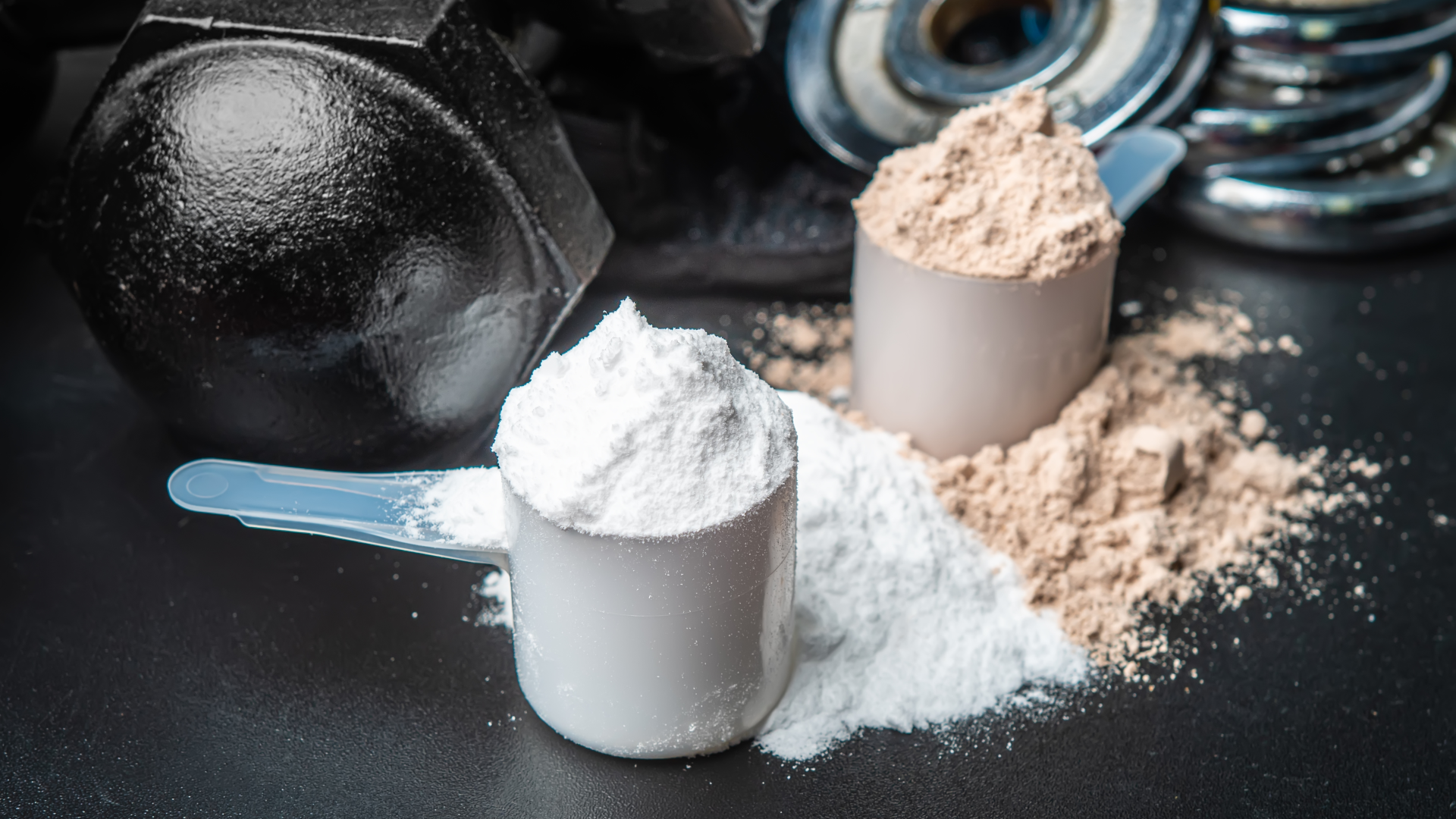Grab your cheat sheet |
“Everyone else in the gym is taking it, so it must be the way to go.”
This can be a mindset we can easily fall into when considering supplements. If the biggest guys in the gym swear by it, it can be easy to think you’ve got to follow suit.
There’s a certain amount of logic in that, but it’s important to remember that what’s right for one person might not be suitable for someone else.
Whey protein gets plenty of decent press, but many things are misconstrued about it that might stop you from integrating it into your fitness routine.
So how do we know if it’s right for us?
Will whey protein really stop our kidneys from working properly or make us lose weight?
Let’s look closely at whey protein, examine what it does and destroy the myths surrounding it to help you figure out whether it’s right for you and your gym routine (spoiler alert: it probably is).
What is whey protein powder?
First things first, what is whey protein powder?
Whey protein is a fast-digesting by-product of dairy protein, suitable for supplementing muscle repair and muscle synthesis.
It’s found in cows’ milk which means it’s an animal protein, and is not suitable for vegans. There are plant protein alternatives, but whey is a complete protein, and is rich in all nine essential amino acids, which is good as we can’t build these in our bodies and need to ingest them as part of our diet.
With such a high nutritional value, it’s no wonder that it’s one of the most popular supplements amongst gymgoers and has become synonymous when people think of protein.
The benefits of whey protein powder…
Whey protein not only helps to increase muscle protein synthesis and power your workout, but it also helps with recovery, not least in repairing damaged muscle tissue after a workout.
Taken alongside a well-structured workout routine, you can expect to improve your body composition and increase muscle mass. Studies have shown that whey protein supplementation will help increase your muscles’ strength and size. It’s also a great way to keep your hunger at bay and avoid taking in unhealthy snacks, which will help keep you on track.
Whey protein myths…BUSTED!
So, given all the benefits listed above, you’d think it was a no-brainer that gym-goers everywhere were including it in their diet. There are plenty of reasons to use whey protein alongside our workouts, and the science behind it is precise.
For many people, it acts as a supplement alongside a healthy, balanced diet to help them increase protein intake, improve strength and recover.
However, many misconceptions and myths surround the efficacy and safety of whey protein powder that hold people back from taking it and getting its benefits.
But now we know what it can do, let’s check out some misconceptions about this wonder supplement and why they are just myths…
Myth 1: Protein is bad for your Kidneys…
You’ve probably seen a headline somewhere over the last few years shouting about how too much protein is damaging your kidneys.
Unless you have underlying health issues with your kidneys, whey protein is unlikely to cause them any problems as long as you’re hydrating when working out.
Our kidneys have an important job as they filter out waste and excess liquid from our body via urine. The suggestion that whey protein is bad for your kidneys may have come from the fact that protein can build up a high concentration of microbe, which the kidneys will need to filter out.

This has led some to believe that you can develop issues such as kidney stones from taking whey protein as a supplement, but flushing out the microbes is a normal part of the process for kidneys.
But unless you consume dangerously high amounts of protein, it’s unlikely to cause any issues. If you drink protein shakes regularly or consume protein bars daily, it’s doubtful that it will cause your kidneys any problems if you have healthy and functioning kidneys.
If you have underlying issues with your kidneys and want to increase your whey protein intake, it’s a good idea to check with your doctor first.
Find out more about how safe whey protein powder is for your kidneys here.
Myth 2: Protein will make you lose weight…
This one isn’t entirely a myth.
It’s true that you can use whey protein as part of a balanced, calorie-controlled diet to help suppress your hunger and keep you full for longer, but whey protein on its own won’t make you lose weight.
It’s quite the opposite when taken as part of an exercise routine. You can expect some gains if you take whey protein supplements regularly. This is because it helps with muscle recovery and growth.
If you’re not putting the additional protein intake to good use, you are likely to see an increase in weight for the wrong reasons, but if you’re supplementing alongside resistance and strength training, you’ll see gains in the form of bigger muscle mass. This will mean less fat but more muscles.
The dichotomy of protein is that you need it as part of a balanced diet whether you are looking to lose weight or increase muscle mass - cutting it out won’t help either. It’s about ensuring that your calorie intake surrounding your protein shake is a balanced and the right amount for whatever your goals are (i.e.. you’ll consume more calories if you are looking to gain weight than if you are trying to lose weight).
Myth 3: Protein doesn’t increase endurance…
It’s a strange rumor, and we’re not sure of its origin, but the fact is - it does help increase endurance if used correctly.
Indeed, if you’re consuming whey protein by the barrel load and not putting in the work at the gym, you’re going to slow down big time, but when used correctly, you’ll be increasing strength, endurance and muscle mass.

Each time you blitz your session in the gym, your body will be crying out for essential amino acids to repair and strengthen your muscle fibers and whey protein is crammed full of exactly what your muscles need.
With stronger muscles, you’ll be able to lift more and stay the distance longer than before. Sure, it does not increase your endurance overnight, but as the weeks go by, you’re likely to notice a big difference.
Myth 4: Protein isn’t good for women…
There is a bit of a myth that protein either isn’t good for women or that it will make them look like Popeye overnight.
The truth is that most women will not build muscle as quickly or as easily as men due to biological differences - but whey protein works exactly the same for women as it does for men.
In addition, it’s safe for women to consume whey protein, as long as it’s relative to their body weight. The concern that started this myth began with the daily protein requirements, which are 56g for men and 46g for women. The idea may have arisen from the idea that, as women don’t need as much daily protein as men, they may consume more protein than they need, which could lead to weight gain in the wrong places.
The fact is that it’s just as safe to take whether you’re a man or a woman, and you’ll gain the same benefits. The difference between genders is likely to be in the shape. For example, a man consuming protein supplements alongside weight training will develop bulkier muscles than a woman. Women will find they have a firmer physique and a leaner muscular shape.
Myth 5: Protein is only for gym workouts...
Protein is an essential nutrient, and regardless of whether you are working out or just working you need to consume it as part of a balanced diet.
Whey protein powder has, quite rightly, become associated with bodybuilders and gym enthusiasts. When we picture someone powering their way through a strength-training exercise, it’s not difficult to imagine them swigging on a protein shake in between sets.
Yes, we know the importance of keeping your body adequately topped up with protein to repair our muscles to progress, but protein is so much more than that.

Our bodies need protein to keep our hair and skin in tip-top condition and boost our energy.
Adding whey protein to a healthy shake is the perfect pick-me-up and will give your body an added boost when it needs it, even if you’re not working out.
It just so happens that protein powder is a relatively cheap, easy and convenient way to top up your protein intake and get the macro-nutrients you need .
How much protein should you consume?
How much protein you need to eat will depend on your goals and your individual body weight and composition.
General guidance is around 1.8g of protein per kg of body weight. However, if you are trying to gain weight and muscle then this can be pushed up to around 2g of protein per kg of body weight.
This means that a man weighing 70kg would be looking to eat around 140g of protein per day. To put this into perspective this is around 4.5 chicken breasts, which is why many people choose to supplement with whey protein powder as it’s a cheaper way to get the right protein amount into your diet.
The main thing to remember is that you need to balance your protein consumption with your goals.
If you are trying to lose weight the protein will help you remain full and build lean muscle, but if you eat way over your calorie goals then you will still gain weight. And equally if you are trying to gain weight and muscle and you don’t eat enough protein and other macros then you will not achieve your goal.
Find out how much protein your body can absorb here.
Should you take whey protein?
Hopefully, we’ve busted those whey protein myths that may have been sitting at the back of your mind stopping you from integrating whey protein into your diet.
Whey protein is packed full of essential amino acids, the building blocks for muscle, bones, hormones and enzymes. Keeping yourself topped up with protein is a great idea, especially if you’re not getting it from your regular diet.
If you’re working out, you’ll want to increase the amount of protein you take to ensure your muscle fibers are being repaired adequately and to give you the energy, strength and stamina to progress.
Build, repair, and recover faster with Crazy Nutrition’s TRI-PROTEIN formula. It is made with six natural, non-GMO proteins that break down in 3 phases for more energy and strength than regular whey, hemp, or soy protein formulas.



